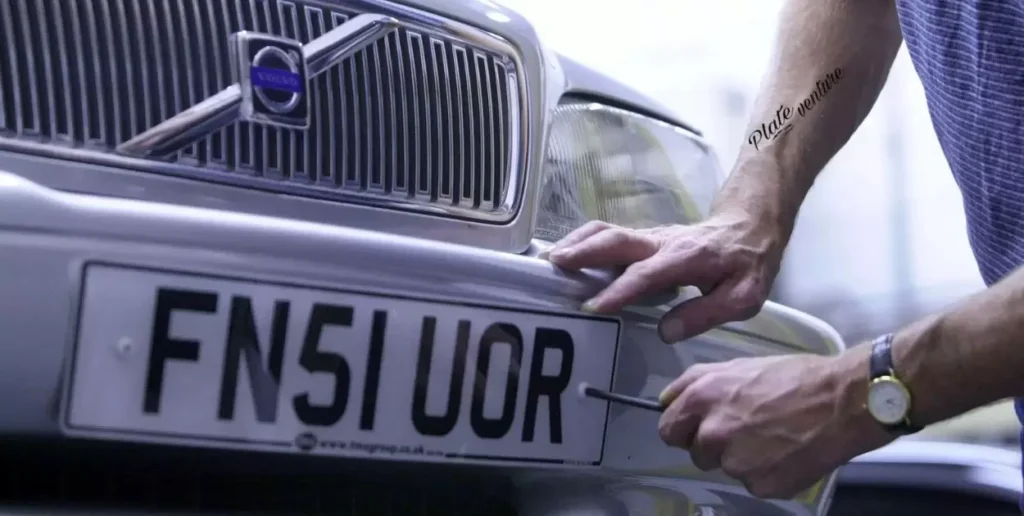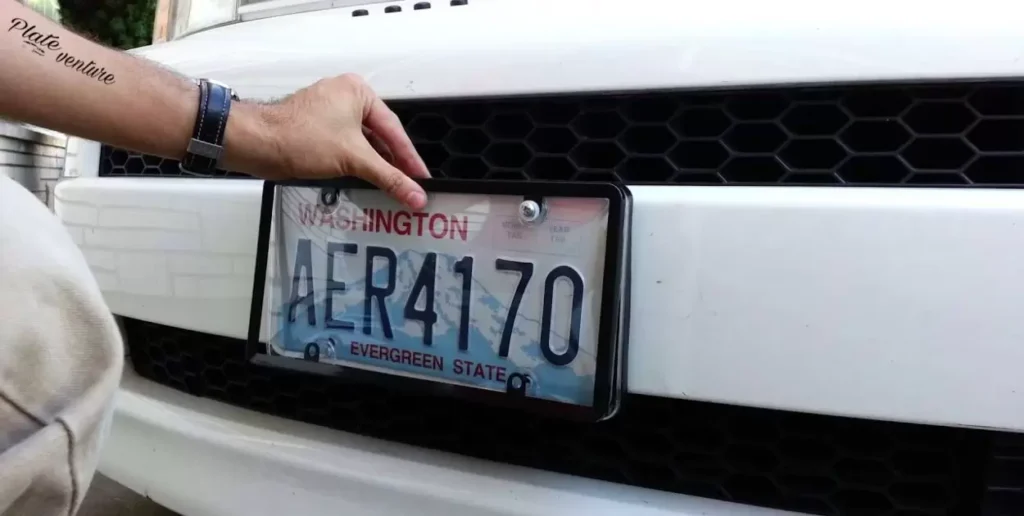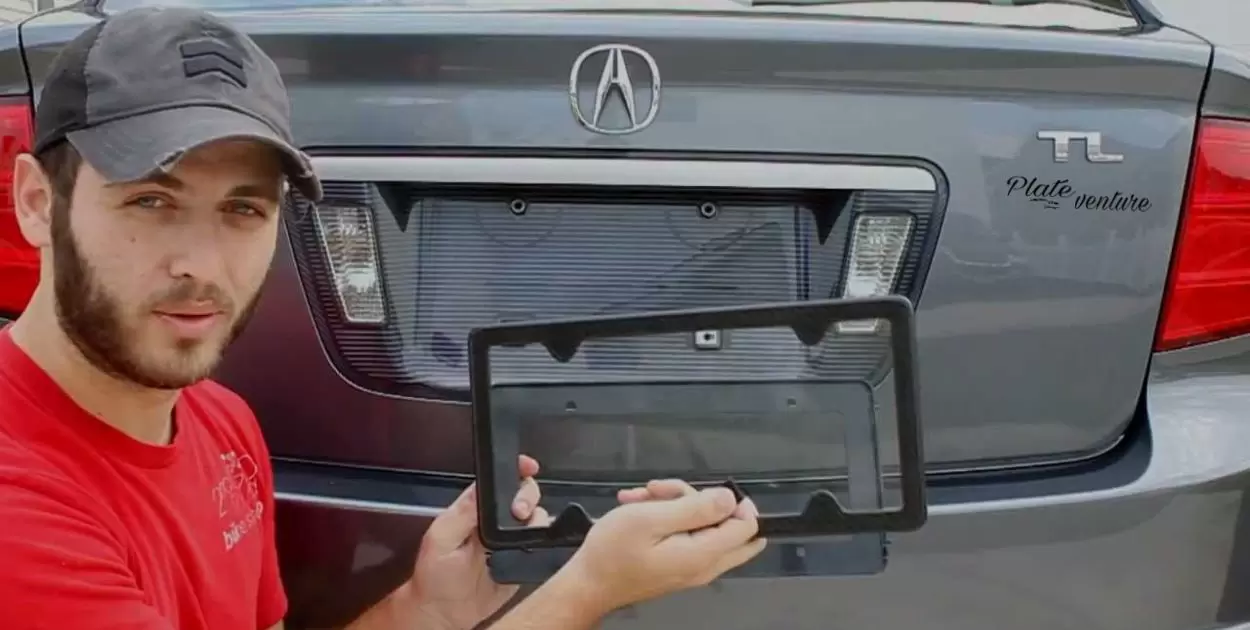A tinted license plate refers to a vehicle registration plate that has been altered or coated with a tinted material, making it less visible or difficult to read. This modification may be illegal in many jurisdictions as it hinders law enforcement and automated recognition systems from accurately identifying the vehicle.
Curious about road safety and legalities? Ever wondered, “Are tinted license plate covers illegal?” Discover the answers that could impact your driving experience and compliance with the law. Uncover the facts and ensure your vehicle remains both stylish and within the bounds of the law.
Tinted license plate covers can be illegal in many jurisdictions. These covers hinder clear visibility and identification, posing a safety risk and obstructing law enforcement efforts. It’s essential to check local regulations to ensure compliance with the law and avoid potential fines or penalties.
Are Tinted License Plate Covers Illegal In Nebraska
In Nebraska, using tinted license plate covers is against the law. The state’s regulations explicitly prohibit any covers that obscure or alter the visibility of license plates. This rule aims to ensure clear identification of vehicles for law enforcement and other purposes.
Violating this law can result in fines and penalties. Nebraska drivers should be aware that tinted license plate covers are not permitted, and using them may lead to legal consequences. It’s essential to prioritize compliance with these regulations to avoid potential issues with law enforcement and maintain road safety.
Understanding Tinted License Plate Covers
Tinted license plate covers are clear plastic shields that drivers use to change the appearance of their plates. People often choose them for customization or to shield plates from weathering. It’s important to know local laws, as some places prohibit these covers due to law enforcement concerns.
To avoid problems, it’s crucial to be aware of the regulations in your area when considering tinted license plate covers. Some regions allow certain levels of tint, while others strictly forbid anything that obstructs plate visibility. Staying informed about these rules ensures a smooth driving experience and helps prevent legal issues related to license plate visibility.
Legal Implications of License Plate Alterations
Altering license plates can lead to serious legal consequences. Individuals should be aware that modifying, covering, or obstructing license plates is often against the law. These alterations can impede law enforcement efforts and compromise public safety by hindering the identification of vehicles involved in incidents.
Understanding the legal implications of license plate alterations is crucial to avoid fines, penalties, or even legal action. It’s recommended to adhere to local regulations regarding license plate visibility and refrain from any modifications that may violate the law.
Are Tinted License Plate Covers Illegal In Missouri
Tinted license plate covers raise questions about their legality in Missouri. Regulations in the state explicitly prohibit obstructing license plate visibility, and tinted covers may violate these rules. Vehicle owners should be aware of Missouri’s laws to avoid potential legal issues related to the use of tinted license plate covers.
In Missouri, it’s essential to note that the legality of tinted license plate covers may vary, and violating the rules could lead to fines or penalties. Checking and adhering to the state’s specific regulations on license plate visibility helps ensure compliance and a trouble-free driving experience.
State-Specific Regulations
Each state has unique regulations regarding license plates. These rules dictate aspects such as plate design, placement, and even the use of license plate frames. Drivers must be aware of their state’s specific requirements to avoid any legal complications related to license plates.
In some states, there are restrictions on personalized license plate messages, prohibiting offensive or inappropriate content. Additionally, certain states have specific guidelines on renewing license plates, including deadlines and associated fees.
Visibility Concerns and Safety Issues
Visibility concerns and safety issues arise when license plates are not easily readable. Proper illumination of license plates is crucial for road safety, allowing other drivers and law enforcement to identify vehicles quickly. A well-lit license plate ensures clear visibility, reducing the risk of accidents and aiding in the swift resolution of traffic-related matters.
To address visibility concerns and enhance safety, it’s essential to regularly check and maintain your vehicle’s license plate lights. Ensure that bulbs are in working condition and that there are no obstructions blocking the plate. Taking these simple steps contributes to overall road safety by promoting clear identification of vehicles, minimizing risks, and supporting efficient law enforcement efforts.
Enforcement of License Plate Cover Laws
Law enforcement actively monitors and enforces license plate cover laws to maintain road safety and security. Officers regularly check for visible and unobstructed license plates to ensure quick identification of vehicles on the road. Violations of these laws, such as using tinted or obstructive covers, can result in fines or penalties.

Drivers must be aware of and comply with license plate cover regulations to avoid legal consequences. Keeping license plates clearly visible not only helps law enforcement but also contributes to overall public safety on the roads. Understanding and adhering to these laws is a simple yet crucial aspect of responsible driving.
Are Tinted License Plate Covers Illegal In Alabama
Tinted license plate covers raise legality questions in Alabama. State law explicitly prohibits any cover that obscures or alters the visibility of license plate numbers. These regulations aim to ensure clear identification for law enforcement and automated systems.
In Alabama, using tinted license plate covers can result in fines or other penalties. It’s crucial for vehicle owners to check local laws to avoid legal complications. Staying informed about these regulations helps maintain compliance and prevents any issues with law enforcement.
Traffic Regulations and License Plates
Traffic regulations play a vital role in maintaining order on the roads. Drivers must adhere to specific rules, and one crucial aspect is ensuring license plates are visible and unobstructed. License plates serve as a means of identification for vehicles, helping authorities monitor and enforce traffic laws.
To comply with traffic regulations, drivers must keep their license plates clean and free from any coverings that might obscure them. The visibility of license plates enables law enforcement to identify vehicles accurately and contributes to overall road safety.
Impact on Automated License Plate Readers
- Enhanced Security: Automated License Plate Readers (ALPRs) utilizing specific keywords can significantly enhance security measures. By incorporating relevant keywords, these systems can quickly identify and flag vehicles associated with security risks, aiding law enforcement in maintaining public safety.
- Efficient Law Enforcement: Keywords play a crucial role in streamlining the process of Automated License Plate Readers. Law enforcement agencies can use targeted keywords to swiftly locate vehicles linked to criminal activities, expediting investigations and responses to potential threats.
- Traffic Management: ALPRs with keyword capabilities contribute to effective traffic management. By incorporating keywords related to traffic violations or alerts, these systems can identify and address issues promptly, contributing to a smoother flow of traffic and improved road safety.
- Customizable Alerts: The use of keywords in ALPRs allows for customizable alert systems. Law enforcement can set specific keywords to trigger alerts for stolen vehicles, missing persons, or other relevant situations, ensuring a focused and efficient response.
- Crime Prevention: Automated License Plate Readers equipped with keyword recognition contribute to proactive crime prevention. By identifying vehicles associated with suspicious activities or individuals, these systems create a deterrent effect and help prevent potential criminal incidents before they occur.
Case Studies on License Plate Cover Violations
Case studies on license plate cover violations reveal common issues faced by drivers. In many instances, individuals unknowingly violate regulations by using covers that obstruct license plate visibility. These studies highlight the importance of understanding local laws to avoid legal consequences related to license plate modifications.
Examining real-life cases helps drivers recognize the potential pitfalls associated with license plate cover usage. Whether it’s for aesthetic reasons or protection, staying informed about regulations is crucial to prevent violations and ensure compliance with the law.
Pros and Cons of Tinted License Plate Covers
Below is a simple table outlining the pros and cons of tinted license plate covers:
| Pros | Cons |
| Aesthetic customization | Legal restrictions in some jurisdictions |
| Protects license plates | Reduced visibility, affecting law enforcement |
| Privacy for personal information | Glare or reflection issues in certain lighting |
| Shields plates from weathering | Potential difficulty in automatic toll booths |
| Prevents theft of registration | Limited visibility in low-light conditions |
Please note that the information provided is general and the actual pros and cons may vary depending on specific product features and local regulations.
Are Tinted License Plate Covers Illegal In Kentucky
In Kentucky, tinted license plate covers are generally not allowed. State law explicitly prohibits any device that obstructs or impairs the legibility of license plates. This means that using tinted covers can lead to legal consequences, including fines or citations.

It’s crucial for Kentucky drivers to be aware of this regulation to avoid any issues with law enforcement. Opting for clear, unobstructed license plates ensures compliance with the state’s laws and helps maintain visibility for identification purposes on the road.
Legal Consequences for Violations
Violating license plate regulations can lead to serious legal consequences. Authorities enforce strict rules to ensure proper identification of vehicles, and failure to comply may result in fines or penalties. Drivers should be aware of their local laws to avoid legal troubles related to license plate violations.
Common violations include obscured plates, using unauthorized covers, or altering plate numbers. Infringing on these rules can result in traffic tickets, increased fines, or even vehicle impoundment. Staying informed about license plate regulations is crucial for responsible driving and avoiding the legal repercussions that come with violations.
Public Opinion and Controversies
Public opinion plays a significant role in the controversies surrounding license plates. People often express their views on various plate designs, slogans, or symbols, influencing the ongoing debates. These discussions can lead to changes in license plate policies as authorities respond to the sentiments and preferences of the community.
Controversies regarding license plates highlight the dynamic relationship between government decisions and public sentiment. Whether it’s a dispute over a specific plate design or the inclusion of certain messages, La Pelan license plate meaning adds another layer to the ongoing discussions. Understanding public opinion helps shape the policies and choices surrounding license plates, including the nuances tied to the significance of the La Pelan license plate in these debates.
Alternatives to Tinted License Plate Covers
Instead of using tinted license plate covers, consider other options for personalizing your vehicle. One popular alternative is custom frames, which come in various styles, colors, and materials. These frames allow you to add a touch of personality without obstructing the visibility of your license plate.
Another option is specialty license plates, which are available in many regions. These plates often feature unique designs or symbols that represent personal interests or affiliations. Choosing an alternative to tinted covers not only adds a personal touch to your vehicle but also ensures compliance with local regulations regarding license plate visibility.
Changing Laws and Recent Developments
Laws surrounding license plates have been evolving recently. Many jurisdictions are updating regulations to address emerging concerns, such as enhanced security features and readability for automated systems. These changes impact vehicle owners, prompting them to stay informed about the latest developments to ensure compliance with updated license plate laws.
In some regions, the focus is on incorporating new technologies, like digital license plates with electronic displays. These developments aim to improve identification processes and enhance overall road safety. As laws continue to adapt to advancements in technology, staying abreast of these changes becomes crucial for motorists to navigate the road legally and efficiently.
Challenges to License Plate Cover Restrictions
People encounter difficulties when facing restrictions on license plate covers. Some argue that these rules restrict personalization rights, limiting the expression of individuality through vehicle customization. Others believe that strict regulations are necessary for public safety, as obscured license plates may impede law enforcement efforts to identify vehicles and maintain road security.
These challenges underscore the ongoing debate between individual freedoms and the need for societal order. Balancing the desire for personal expression with the responsibility of adhering to regulations remains a complex issue, prompting ongoing discussions about the appropriate limits on license plate cover use.
Are Tinted License Plate Covers Illegal In Massachusetts
In Massachusetts, the use of tinted license plate covers is illegal. The state’s regulations explicitly prohibit any cover or device that obscures or alters the visibility of license plates. This strict stance aims to ensure clear identification of vehicles for law enforcement and other security purposes.
Violating the ban on tinted license plate covers in Massachusetts can lead to fines and penalties. It’s crucial for vehicle owners in the state to be aware of this regulation to avoid legal consequences and maintain compliance with local traffic laws.
Law Enforcement Perspectives on License Plate Covers
Law enforcement holds varying perspectives on license plate covers. Many officers argue that clear and unobstructed license plates are essential for public safety, enabling quick identification of vehicles and aiding in criminal investigations. They believe that restrictions on license plate covers are necessary to maintain effective law enforcement practices.
From the law enforcement standpoint, the concern is not only about identifying vehicles but also about ensuring a smooth flow of traffic and preventing potential misuse of license plate covers. Officers emphasize the importance of clear and visible plates to uphold road safety and facilitate their duties in maintaining order.
Steps to Check if Your Cover is Legal
To ensure the legality of your license plate cover, follow these simple steps. First, check local regulations regarding the use of license plate covers in your area. These rules often vary, and understanding them is crucial to avoid legal issues.
Next, examine your cover to ensure it complies with the specified guidelines. Confirm that it doesn’t obstruct the visibility of your license plate numbers. Taking these steps helps you maintain compliance with the law, ensuring a hassle-free driving experience.
Tips for Choosing Legal License Plate Covers
Here’s a simple table outlining tips for choosing legal license plate covers:
| Tip Number | Tips for Choosing Legal License Plate Covers |
| 1 | Know Local Regulations: Familiarize yourself with local laws regarding license plate covers to ensure compliance. |
| 2 | Check Transparency Levels: Ensure the cover is transparent enough to maintain clear visibility of license plate numbers. |
| 3 | Verify Size and Fit: Choose a cover that fits your license plate properly without obstructing any important information. |
| 4 | Avoid Obstructive Designs: Opt for covers with simple designs that don’t obstruct characters or features on the license plate. |
| 5 | Consider Material Quality: Select durable and weather-resistant materials to ensure the cover withstands various conditions. |
| 6 | Review Reflectivity: Check if the cover maintains the reflective properties required for nighttime visibility. |
| 7 | Stay Informed: Regularly check for updates on license plate cover regulations to adapt to any changes in your area. |
These tips can guide individuals in choosing license plate covers that are both personalized and legally compliant.
Advocacy for or Against License Plate Cover Regulations
People express strong views either supporting or opposing license plate cover regulations. Advocates in favor argue that clear visibility of license plates is crucial for law enforcement and public safety. They emphasize the need to adhere to standardized rules to maintain order on the roads.
On the other hand, opponents contend that these regulations infringe on personal freedoms, restricting the ability to customize vehicles as a form of self-expression. They argue for a balance between individual rights and societal regulations, advocating for more flexible rules that accommodate personal preferences while addressing safety concerns.
Are Tinted License Plate Covers Illegal In Oklahoma
In Oklahoma, the use of tinted license plate covers raises questions about legality. State regulations explicitly address the visibility of license plates, and some argue that tinted covers may violate these rules. Those considering these covers should be aware of the potential legal consequences and the specific restrictions outlined in Oklahoma’s traffic laws.
It’s crucial for Oklahoma drivers to consult the state’s regulations to determine whether tinted license plate covers are permitted. Understanding the local laws ensures compliance with the rules and helps avoid any legal issues related to license plate visibility.
Frequently Asked Question
Are tinted license plate covers illegal in Canada?
Tinted license plate covers may be illegal in Canada, depending on provincial regulations. It’s important to check and adhere to local laws regarding license plate visibility.
Are smoked license plate covers legal in Florida?
In Florida, the legality of smoked license plate covers depends on the degree of tint. It’s essential to check and adhere to state regulations to ensure compliance.
Are smoked license plate covers legal in Illinois?
Smoked license plate covers may not be legal in Illinois. Check state regulations to ensure compliance with specific laws on license plate visibility.
Are smoked license plate covers legal in NY?
Smoked license plate covers are generally illegal in New York as they can obstruct the visibility of license plates, violating state regulations on plate visibility. It’s advisable to check and comply with local laws to avoid potential legal issues.
Conclusion
The question of whether tinted license plate covers are illegal remains a significant consideration for vehicle owners. Understanding the regulations in your area is crucial to avoiding potential legal consequences. While some may argue for personalization rights, the overarching theme underscores the importance of striking a balance between individual expression and adherence to the law.
In jurisdictions where the use of tinted covers is prohibited, it is advisable for drivers to prioritize compliance, ensuring a trouble-free experience on the road and steering clear of any complications related to the legality of tinted license plate covers.








